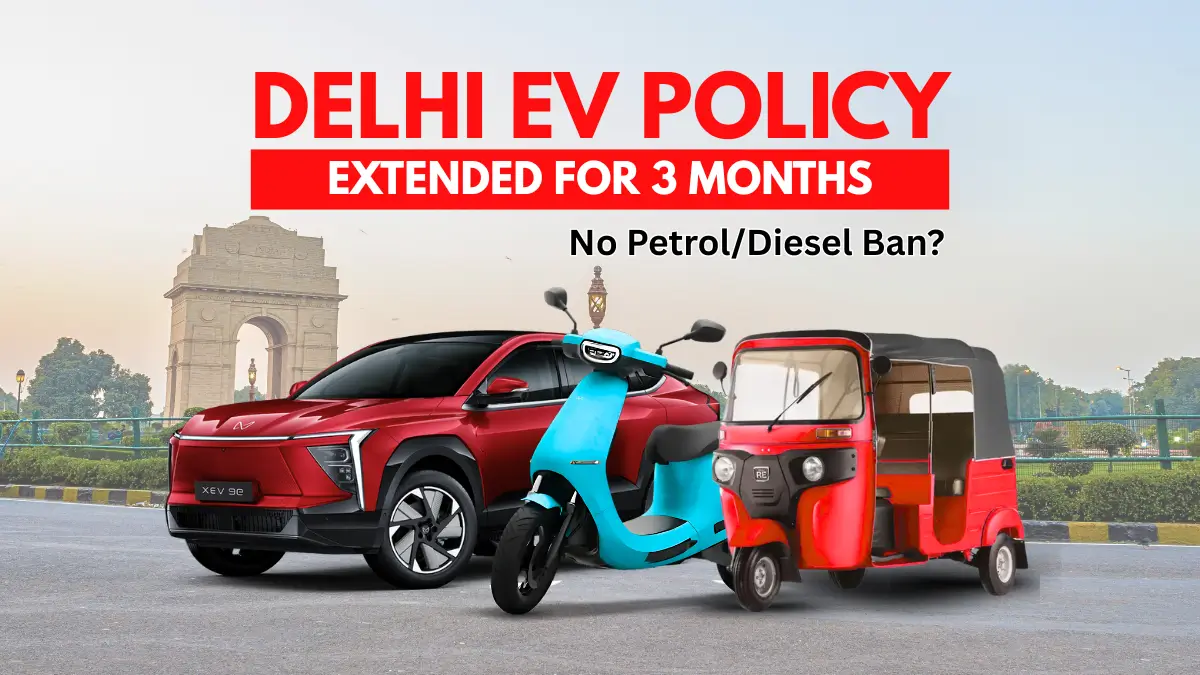
In an effort to promote cleaner mobility, the Delhi government has once again approved a three-month extension of its ongoing EV policy to ensure seamless implementation and avoid any policy gap during the transition.
The State had previously extended the ongoing EV policy 2.0 by an additional 15 days following its expiration on 31st March, to ensure continuity while the new policy is being finalised. The EV policy has been extended multiple times under both the previous regime of AAP and the BJP-led government.
The Delhi Government has also stated that the ongoing policy shall remain in force till the New EV Policy 2.0 is officially enforced in the State.
Meanwhile, the newly released draft of the EV Policy 2.0 is still under consideration and currently awaiting approval from the State cabinet. It may also be revised further before being officially implemented by the State.
According to a PTI report, the decision to extend the existing EV policy was made during a cabinet meeting led by Delhi Chief Minister Rekha Gupta.
Following the cabinet meeting, Delhi’s Transport Minister, Pankaj Singh, further stated that no bans would be imposed on auto-rickshaws or any other vehicle categories.
“There are many things the government wants to do for its residents, and we will incorporate those in the revised EV policy. However, I want to make it clear that there will be no ban on auto-rickshaws, nor is there any proposal to ban any category of vehicles. The current EV policy is expected to continue for approximately the next three to four months,” he clarified.
The EV Policy 2.0 is another initiative by the Delhi Government to promote the development of the electric mobility segment in the State.
The Delhi State Government has been actively promoting the adoption of EVS and alternate fuel-based mobility options to deal with the rising pollution as well as to reduce the dependency on fossil fuels.
The EV Policy 2.0 is drafted not only to accelerate the shift towards electric mobility in Delhi but also proposes quite a few incentives aimed at ensuring a much smoother transition.
The draft policy includes dedicated subsidies for women buyers of Rs 10,000 per kWh of battery capacity, with the total subsidy capped at Rs 36,000, encouraging their active participation and contribution towards this shift.
In addition to this women specific subsidy, the draft policy also proposes a subsidy of Rs 10,000 per kWh of battery capacity, with the total subsidy capped at Rs 30,000 for all electric two-wheeler buyers and Rs. 45,000 for electric autos (L5M Category), empowering them to join in the State’s transition to electric mobility.
Additionally, the draft policy suggests a scrapping incentive of upto Rs. 10,000 for ICE two-wheelers and Rs. 20,000 for ICE autos that are less than 12 years old as well.
To further facilitate this transition, the government is also considering a replacement incentive of upto Rs. 1 lakh per vehicle. However, all these incentives are still under consideration and not yet finalized.
The New Delhi EV Policy 2.0 aims for 95 per cent electric vehicle penetration by 2027, development of an expansive network of charging infrastructure and creation of 20,000 jobs in relation to electric mobility in the process.
Once implemented, the policy will remain valid till 31st March 2030 and help facilitate a smoother transition to sustainable transportation in the Capital.
This EV Policy outlines a phased out transition across all major vehicle segments, such as two-wheelers, three-wheelers, public buses, goods carriers and civil garbage collection vehicles.
With providing incentives and subsidies as one of it’s key aspects, the Delhi Government aims to reduce pollution from older, outdated vehicles, encourage quicker EV adoption as well as facilitate a smoother transition to sustainable transportation.
Building on the success of the previous policy, this new draft lays the foundation for a more structured and focused move towards electric mobility.
In July 2025, Tata Motors sold 7,124 electric cars in India, marking a strong comeback and surpassing MG Motor India's 6,678…
India is progressing rapidly towards a cleaner energy future. Whether it’s electric vehicles (EVs), rooftop solar installations, or industrial power…
India’s electric four-wheeler (E4W) segment surged in July 2025, hitting an all-time high in monthly sales and accelerating its year-to-date…
A major step forward for India’s emerging EV industry, Tesla, the world’s leading electric vehicle manufacturer, has launched its first-ever…
Bengaluru-based Oben Electric launched the Rorr EZ Sigma, a significant update to its existing Rorr EZ lineup. With two battery…
ThunderPlus, one of India’s fastest-growing EV charging networks, recently hosted a prestigious academic delegation from two of the world’s top…
This website uses cookies.